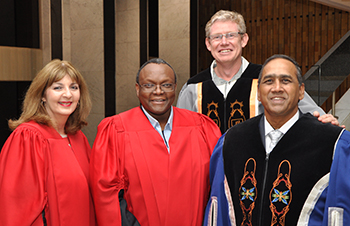Latest News Archive
Please select Category, Year, and then Month to display items
24 September 2024
|
Story Aimée Barlow
|
Photo Supplied
 Louzanne Coetzee, who made history by clinching South Africa’s second medal at the Paralympics, earning a bronze in the T11 1 500 m women’s final with a personal best time, received a warm reception when she recently returned home.
Louzanne Coetzee, who made history by clinching South Africa’s second medal at the Paralympics, earning a bronze in the T11 1 500 m women’s final with a personal best time, received a warm reception when she recently returned home.
The celebrated Paralympic bronze medallist Louzanne Coetzee returned home to a warm welcome at the Bram Fischer International Airport on 10 September 2024.
Family, friends, colleagues, Arista students, and media gathered to celebrate her remarkable achievement and show their support.
Coetzee – KovsieSport Coordinator of Parasport at the University of the Free State (UFS) – made history by clinching South Africa’s second medal at the Paralympics, earning a bronze in the T11 1 500 m women’s final with a personal best time. Her dedication and hard work have not only brought her personal glory but have also inspired many in her community.
Among those present to welcome her was Jerry Laka, Director of KovsieSport, who expressed his pride in Coetzee’s accomplishments.
"We as KovsieSport are so proud of our colleague Coetzee. It is amazing to see a product of KovsieSport achieving greatness on the world stage. She is truly an inspiration to us all," said Laka.
“I am so glad to be back, and to have Laka and my colleagues here. It means the world to me. Having Laka here shows his commitment to my career and ParaSport and his staff in general,” shared Coetzee, her gratitude evident.
She further expressed her appreciation for the support she received, stating, “I don’t have the words to describe how thankful I am for the support from the UFS community.”
Coetzee’s return is a proud moment for South Africa and the University of the Free State (UFS) community. Welcome home, Louzanne! Your achievements have made us all proud!
Prof Tim Murithi calls for Africa to design new global order
2016-06-02

From left: Prof Heidi Hudson, Head of Centre for Africa
Studies (CAS); Prof Tim Murithi, Extraordinary Professor
at CAS; Prof Lucius Botes, Dean of the Faculty of
the Humanities; and Prof Prakash Naidoo, Principal of
Qwaqwa Campus.
Photo: Stephen Collet
“What do Africans have to say about the remaking of the global order?” was the opening question of Prof Tim Murithi’s lecture which was hosted by the Centre for Africa Studies (CAS) of the University of the Free State (UFS) to celebrate Africa Day on 25 May 2016.
The annual Africa Day Memorial Lecture, entitled: Africa and the Remaking of the Global Order, doubled as Prof Murithi’s inaugural lecture. He is CAS’s newly-appointed Extraordinary Professor, as well as the Head of the Justice and Reconciliation in Africa Programme at the Institute for Justice and Reconciliation in Cape Town. He made a compelling argument for the need for Africa to exert an active influence on international narratives of peace, governance, justice, and reconciliation.
“If we are waiting for American leadership to get us out of the quagmire of a situation we are in, we will be waiting for a long time,” said Prof Murithi.
The Head of the Centre, Prof Heidi Hudson, concurred with Prof Murithi’s suggestion of devising African solutions for African problems. She quoted Audre Lorde’s well-known assertion that “The master’s tools will never dismantle the master’s house.”
Remembering 1963
Over five decades ago, on 25 May 1963, the Organisation of African Unity was formed, and was renamed the African Union in 2002. Africa Day marks this pivotal point in the continent’s history. On this day, we reflect on the continent’s journey into democracy, peace, stability and socio-economic development. It is also an opportunity to celebrate African identity and heritage.
Continent-building dialogues
The UFS Sasol Library celebrated Africa Day with a book launch. Facets of Power. Politics, Profits and People in the Making of Zimbabwe's Blood Diamonds by Tinashe Nyamunda is a reflection of some of the challenges that Zimbabwe continues to face. It details the disadvantaged position which the country finds itself in due to greed, maladministration, and corruption, despite possessing large deposits of minerals.
In celebration of Africa Month, CAS has held a series of lectures by esteemed scholars from across the globe. Earlier in the month, Prof Henning Melber presented lectures on Namibia’s independence and the African middle class. Kevin Bloom and Richard Poplak unpacked the issues surrounding Africa’s continental shift, while Prof Joleen Steyn Kotze focused on the possible fall of the African National Congress.